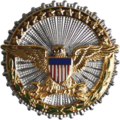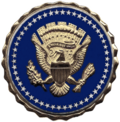Top Qs
Timeline
Chat
Perspective
Brad Cooper (admiral)
U.S. Navy admiral From Wikipedia, the free encyclopedia
Remove ads
Charles Bradford "Brad" Cooper II (born 1967) is a United States Navy admiral who has served as the commander of United States Central Command since 2025. He most recently served as deputy commander of the United States Central Command from 2024 to 2025, and previously commander of United States Naval Forces Central Command, Commander, United States Fifth Fleet and Commander, Combined Maritime Forces from 2021 to 2024.
Cooper was commissioned from the United States Naval Academy in 1989. He has been deployed during operations in Iraq, Afghanistan, South America, and the Balkans. A surface warfare officer, he has commanded a destroyer, a cruiser, United States Naval Forces Korea, and Expeditionary Strike Group 7. Cooper has also served in the Combined Security Transition Command Afghanistan and the Navy Personnel Command. His other senior posts include as Commander, Naval Surface Force Atlantic, and, before that, as the Chief of Legislative Affairs of the United States Navy.
In June 2025, secretary of defense Pete Hegseth announced that Cooper was president Donald Trump's nominee for commander of the United States Central Command. Cooper will be the first Navy admiral to hold the post since William J. Fallon in 2008.
Remove ads
Early life and education
Charles Bradford Cooper II[2] was born in 1967[3] and is the son of a U.S. Army officer.[4] He attended Sidney Lanier High School in Montgomery, Alabama, and is a 1989 graduate of the United States Naval Academy,[2] where he obtained a bachelor of science degree in economics.[1] Cooper later earned a master's degree in strategic intelligence from the National Intelligence University,[5] and also studied national security policy and international relations at Harvard and Tufts Universities.[4] He is also a graduate of the United States Army Command and General Staff College.[1]
Remove ads
Naval career
Summarize
Perspective
A career surface warfare officer, he served on guided-missile cruisers, guided-missile destroyers, aircraft carriers and amphibious assault ships.[4] Cooper's assignments included the USS Thomas S. Gates (CG 51), operations officer of the USS Fitzgerald (DDG 62) and USS Anzio (CG 68), and executive officer of the USS Vicksburg (CG 69).[1] He was also the flag aide to the commander of the USS Dwight D. Eisenhower Carrier Strike Group.[1] His ship commands were the USS Russell (DDG 59) and USS Gettysburg (CG 64).[4]
Among his deployments were Operation Desert Storm; three counter-narcotics operations off the coast of South America; the enforcement of the no-fly zone over Bosnia and Herzegovina and operations in the build up to the Kosovo War; Haitian migrant operations; a deployment in the Western Pacific, and multiple deployments in the Middle East, including on the ground during the war in Afghanistan.[1]
Ashore, he served in a variety of executive, military assistant and special assistant roles in the White House, the Office of the Secretary of Defense, U.S. Africa Command and U.S. Pacific Fleet headquarters.[4] These included special assistant to the Commander, U.S. Africa Command; division chief for strategic reform of the Afghan Police and Border Guards while assigned to Combined Security Transition Command, Afghanistan; and flag aide to the Commander, U.S. Pacific Fleet.[1] He also served as principal U.S. Advisor to the Interior Minister of Afghanistan[4] and both Deputy Director[1] and Director, Surface Warfare Officer assignments (Pers-41),[4] at Navy Personnel Command.[1]
As a flag officer, he served as the Chief of Legislative Affairs, where he led the Navy's engagement with the U.S. Congress. Other tours include commander, Naval Surface Force Atlantic, where he launched new initiatives to expand mental health care access for sailors and improve fleet-wide readiness; commander, Expeditionary Strike Group 7 in Okinawa, Japan, where he led the U.S. military's first F-35 deployment; and, commander, U.S. Naval Forces Korea. During this tour, his sailors were honored with the Republic of Korea Presidential Unit Citation, the first such recognition of a Navy unit since the Korean War.[4] During his tenure as commander of Naval Forces Korea, Cooper was bestowed the Korean name Goo Tae-il[a] by the ROK-US Alliance Friendship Association in honor of his service to the Korean peninsula.[6]
In April 2021 he was nominated for promotion to vice admiral and the position in Bahrain of Commander, U.S. Naval Forces Central Command; commander, U.S. Fifth Fleet; and commander, Combined Maritime Forces.[7][8] Cooper assumed command on 5 May 2021.[9] During this tour, he significantly expanded multi-national maritime partnerships, established the Navy's first unmanned and artificial intelligence Task Force, and led multiple real world operations countering Iranian and Houthi malign activity throughout the Middle East, including operations Prosperity Guardian and Poseidon Archer in the southern Red Sea.[5] He was in charge of U.S. naval forces in Middle Eastern waters when Operation Prosperity Guardian began in December 2023 to defend merchant ships from attacks by the Houthis in Yemen.[10]
In April 2023, Cooper was nominated for reappointment as vice admiral and assignment as the deputy commander of United States Central Command.[11][7] He took office in February 2024.[12] That same month, he told the media that the actions against the Houthis represent the largest and most intense operation of the U.S. Navy since World War II.[13] In June 2025, secretary of defense Pete Hegseth announced that Cooper was president Donald Trump's nominee for commander of the United States Central Command.[14] At his nomination hearing, Cooper said that the U.S. should maintain its military presence in Syria as part of the war against the Islamic State, and should work with the Syrian transitional government against IS.[15]
On 8 August 2025, he succeeded Michael Kurilla as commander of U.S. Central Command.[16]
Remove ads
Personal life
He is married to Susan, who is a speech-language pathologist, and they have two children.[1]
Cooper was briefly a fellow of the Asia Pacific Center for Security Studies.[1]
Awards and decorations [citation needed]
 | ||
 | ||
 | ||
 | ||
Remove ads
Notes
- In this Korean name, the family name is Goo.
References
Wikiwand - on
Seamless Wikipedia browsing. On steroids.
Remove ads

